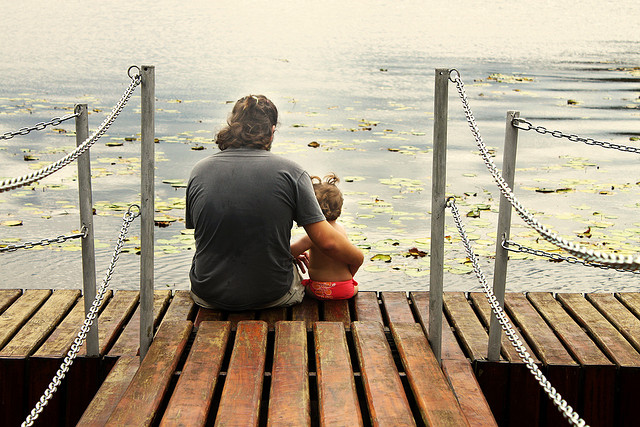I’ve gotten very good at forgiving.
I do it regularly. It’s not because I continue to allow myself to be a victim; it’s because I’ve come to find that for more serious transgressions, forgiveness is not a destination.
I was accused of a crime I did not commit. Most of the people involved in prosecuting me knew I did not commit the crime, or at least that “there was something fishy” with the charges. I went to jail for about a year. After I took a plea (where I maintained my innocence), I was transferred to prison for a total of 18 months of incarceration. I lost everything that I believed was important to me.
For a multitude of reasons, I had to redefine myself when I got out.
I had a phrase that became my mantra when I was in behind bars: “I’ll be better for it.” I also had one other mantra, “f*ck ‘em,” which was arguably less “enlightened.” Both really helped get me through those times.
The concept of “I’ll be better for it” meant that no matter what they did to me, no matter how they hurt me, I would not break. I would not become who they saw me as being. I would not be less of a man. It would make me, not break me.
People find religion and read lots of self-help books in jails and prisons. I wasn’t focused on any dogma. I just knew that the only way I would be okay with what happened is if it made me a better person.
I knew anger was eating me up inside, causing me to make poor choices. I would have to let it go in order to fulfill my newfound “be better” ideology. The problem was, I could not imagine giving the people who hurt me forgiveness because I felt it was like some sort of favor to them—some sort of acceptance that what they did was okay. But nothing could make it okay. Not ever. I spent weeks thinking about this. And then I came to a conclusion:
Forgiving has nothing to do with the person you are forgiving.
That’s what I figured out. I said to myself, “I’m in jail. They’re out there. They couldn’t care less if I forgive them or not. Besides, I can’t tell them anyway. So what’s it doing for me?”
Then I realized I could forgive them for me. They wouldn’t know. They didn’t have to know. They didn’t gain from it, I did. Forgiveness is letting go so that their actions no longer affect me in any negative way.
How to forgive—step by step:
I wrote this step-by-step guide on how to forgive while I was in jail and I read it and adjusted it over and over. The reason I kept referring back to this is because I kept having to re-forgive. I got angry again. I had to come back to my plan, make some adjustments as needed, and forgive again.
Accept what happened.
They don’t get a pardon. Accepting what happened does not mean that what happened was okay or right. But it did happen. Denial isn’t any better than anger. No matter what someone did to you, somebody else has it worse. Appreciate that you are who you are and are capable of getting over this. Accept the part you played in the incident. Accept that you allowed yourself to be a victim. Accept it and move on to the next step.
Acknowledge and appreciate what you’ve gained from the experience.
This one was hard for me to swallow, but consider the best revenge towards anyone who wants the worst for you. Be successful. Be happy. Play the game of life to win, whatever winning means to you, and enjoy life to the fullest of your abilities. Think about it.
Consider what you’ve learned from the situation and appreciate the knowledge gained. Turn that knowledge into wisdom and be better for having gone through it. We learn something every time we’re significantly hurt, or we’re really not living life to the fullest. The people who hurt me taught me so much, and the incident was the catalyst for what I have, what I love, what I do and who I am today.
If you can’t think of anything you’ve learned, or any way you can be better and wiser for, you’re not trying hard enough.
Stop gossiping about it, stop wishing on it, stop dwelling.
Relieving the incident can be a valuable way to come to terms with and then move on from emotional trauma. Gossiping with friends and family and anyone else over and over again is just negative behavior that does nobody any good, and often makes it hard to move on from the event. There are much more productive, awesome and magical things one could be experiencing and doing. Also, it’s generally not so easy to grow as a person or to see your own part in a situation when you’re telling a story to biased friends and family who continue to fuel your outrage.
Forgive yourself.
You’re not forgiving anyone to give them a break or to accept their behavior as okay or to pardon them. You forgive yourself for being a victim. Forgive yourself for allowing yourself to be hurt by someone else’s actions.
You played a part in getting hurt. Accept responsibility for your part and your lot in life, even if it was simply being in the wrong place at the wrong time. Don’t let anybody else be responsible for your life and how you live it. Don’t give someone the power to alter you (unless it’s for the better) and dictate your actions in life. Forgive yourself, live life, and repeat the process.
Another common phrase we all say when we’re talking about those who have wronged us is, “I just wish that he/she would…” This is a sign that one has not yet moved on. Why waste a wish? We’ve got at least a few wishes that will come true in this lifetime, hopefully many. Do you really want such a person to get your manifestation energy? If you had a wish, could you really see yourself wasting it on them? If you do, you’re still being a victim, and it’s time to stop.
Repeat the process over and over again.
The two most valuable lessons I learned involving forgiveness are that you have to take responsibility and forgive yourself and that you have to do it again and again.
It’s one thing to let go of something when it didn’t reroute your entire life. It’s a whole other thing to forgive someone when there are constant reminders about what you lost, what’s changed, what will never ever be the same. My ex-wife accused me of child molestation and no matter how clear it was that I was innocent, I learned the hard way that the system is all about profit and I was cattle. I lost my daughter. I am not legally her father anymore. It hurts me beyond any explanation I could give, and it hurts over and over again.
I have had to forgive my ex-wife, many other people involved at various levels, the whole system and, consequently, all of society. How do you forgive all of that? You forgive yourself. And then you forgive yourself again. I was stupid. I made tons and tons of mistakes that led to my loss.
Every time I see a father having a good time with his child, it hurts like hell! I have a son now, and I am happily married with another child on the way. Yet, more than a decade later, at least once a week, I look into my son’s eyes and I see my daughter. It rips apart a wound that will never fully heal.
At some point it just dawned on me that forgiveness, like every other thing that is great in life—marriage, running your own business, raising a child—is often very difficult and takes a lot of work. But forgiveness is one of the most amazing gifts you can give yourself.
The truth…
The truth is that I appreciate my ex-wife. Today, I love her and I appreciate her. When I put myself in her shoes, I totally understand why she did what she did. I don’t think she is a bad person. I look at her (in some light and, in my opinion, justifiable cyber stalking), and I see that she’s done well for herself in ways that I value. I thank her for what happened. I accept that she may never experience any negative consequences for her actions (at least I may not know of them), and I accept that she has likely convinced herself that she was right all along with her actions (you know how people are). But I love her for the hand she played in creating what I consider to be a much better version of me. Though today I forgive her and appreciate her, tomorrow I may hate her again. Fortunately, forgiveness gets easier over time, especially when you learn from your own mistakes and refuse to go through life as a victim.
Conclusion
I spent a lot of time reliving painful incidents surrounding the situation. Sometimes I was just dwelling, which had to be done to some extent. Most of the time, when I thought about it, I put it aside to give it uninterrupted time to do some therapeutic work. I imagined the event in black and white from a distance as a third party observer. I changed facts, added in cameos, made a movie about it. I saw myself and others react in different ways. I picked it apart piece by piece and came to terms with it.
If you’re getting over something that’s incredibly painful, and you feel you still haven’t really dealt with it on an emotional level, find a way to view the incident in your own head in a way that is easier to stomach. Maybe tint the scene with your favorite color, or imagine it’s a play that you are acting in and everyone starts exaggerating their actions like they do in plays. Turn it into a comedy. And try imagining someone else you love is in the same situation, and ask yourself how you would suggest they overcome it.
Remember, forgiveness is not allowing somebody else to have any power over you. When you forgive, they no longer control and define you. Only you can decide not to be a victim. And don’t forget, forgiveness is a journey, not a destination.
It wasn’t easy for me. I was depressed and angry for a long time. I still feel it. It’s always there. But it doesn’t run my life. Find your therapy. Viewing the incident in my head like a film, writing, family and exercise have become my therapy. If you’re dealing with depression due to a circumstantial situation, check out I’m Depressed. If you’d like to read more about what happened with me, I have written about that as well, and you can read it here.
~
Author: Michael Edwards
Editor: Caroline Beaton
Image: Flickr












Read 4 comments and reply